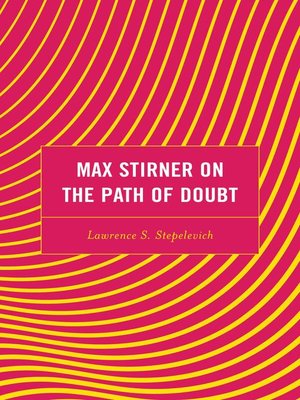Max Stirner on the Path of Doubt
ebook ∣ Continental Philosophy and the History of Thought
By Lawrence S. Stepelevich

Sign up to save your library
With an OverDrive account, you can save your favorite libraries for at-a-glance information about availability. Find out more about OverDrive accounts.
Find this title in Libby, the library reading app by OverDrive.



Search for a digital library with this title
Title found at these libraries:
| Library Name | Distance |
|---|---|
| Loading... |
Max Stirner on the Path of Doubt examines Stirner's incisive criticism of his contemporaries during the period from the death of Hegel, in 1831, to the 1848 German Revolution. Stirner's work, mainly the Ego and His Own, considered each of the major figures within that German school known as "The Young Hegelians." Lawrence S. Stepelevich argues that for Stirner, they were but "pious atheists," and their common revolutionary ideology concealed an ancient religious ground – which Stirner set about to reveal. The central doctrine of this school, that Mankind was its own Savior, was initiated in 1835 by the theologian, David F. Strauss's in his Life of Jesus , and it progressed with August von Cieszkowski's mystical recasting of history, followed by Bruno Bauer's absolute atheism and Ludwig Feuerbach's statement that "Man is God." This soon found reflection in the "Sacred History of Mankind" declared by Moses Hess. Within a decade, the result was the secular reformulation of this theological ideology into the "Scientific Socialism" of Karl Marx and Frederick Engels. Although linked to it, Max Stirner was the most relentless and feared critic of this school. His work, never out of print, but largely ignored by academics, has inspired countless "individualists" set upon rejecting any form of religious or political "causes," and finding Stirner's assertion that he had "set his cause upon nothing" took this as their own cause.







